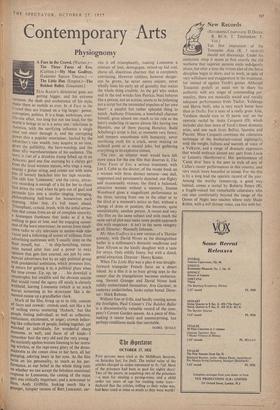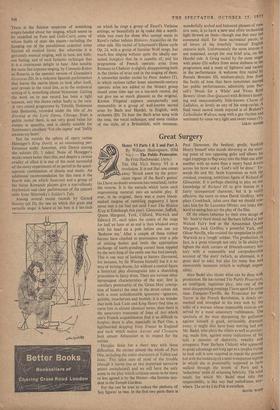New Records
(RECORDING COMPANIES: D, Decca ; R, RCA; T. Telefunken; V, Vox.) THE first impression of the Toscanini Aida (R, 3 records) should not discourage. Under his autocratic whip it seems at first exactly the old warhorse that superior persons smile indulgently about, but after a time the virtues also of the fierce discipline begin to show, and to work, in spite of very wilfulness and exaggeration in the treatment, for instead of against Verdi's genius. Although Toscanini prefers as usual not to share his authority with any singer of commanding per- sonality, there are musically sound and vocally adequate performances from Tucker, Valdengo and Herva Nelli, who is very much better here than in Otello. For a taste of a really great Aida, Verdians should turn to '0 patria mia' on the operatic recital by Anita Cerquetti (D), which includes also four more of Verdi's finest dramatic arias, and one each from Bellini, Spontini and Puccini. Mme Cerquetti combines the coloratura technique of the featheriest-voiced nightingale, with the weight, fullness and warmth of voice of a Valkyrie, and a range of dramatic expression that would embrace almost any part from Lucia to Leonora (Beethoven's). Her performance of 'Casta diva' here is the peer in style of any of Callas's recent performances in this country, and very much more beautiful in sound. For me this is by a long lead the operatic record of the year. Among the worthy runners-up, a good way behind, comes a recital by Roberta Peters (R), a fragile-voiced but remarkable coloratura who can soar comfortably beyond the range of the Queen of Night into reaches where only M ado Robin, with a still thinner voice, can live with her, There is the faintest suspicion of something empty-headed about her singing, which seems to be modelled on Pons and Galli-Curci, some of whose faults of taste she shares—including the hanging out of the penultimate cadential notes beyond all musical limits. But otherwise it is genuinely musical singing, well in tune, not with- out feeling, and of such fantastic technique that it is a continuous delight to hear. Also notable for some fine soprano singing, by Consuelo Rubio as Rosario, is the operatic version of Granados's Goyescas (D), in a welcome Spanish performance that leaves the native idiom to look after itself, and reveals in the vocal line, as in the orchestral setting of it, something almost Straussian. Getting the work on to one record has been a tight squeeze, and this shows rather badly at the turn. A very mixed programme by Tebaldi, Simionato and Bastianini, recorded under the title of An Evening at the Lyric Opera, Chicago, from a public recital there, is not very good value for money in quantity, and is chiefly notable for Simionato's excellent 'V& the sapete' and 'Softly awakes my heart.'
Not far outside the sphere of opera comes Honegger's King David, in an outstanding per- formance under Ansermet, with Danco among the soloists (D, 3 sides). None of Honegger's works wears better than this, and despite a certain crudity of effect it is one of the most successful of the many experiments of its period in the quasi- operatic combination of drama and music. An additional recommendation for this issue is the fourth side, on which Ansermet and a group of the Suisse Romande players give a marvellously rhythmical and clear performance of the concert suite from Stravinsky's Soldier's Tale.
Among several recent records by Gerard Souzay (all D), the one on which this great and versatile singer is heard at his best is a ten-inch
on which he sings a group of Faures Verlaine settings, so beautifully as to make this a worth- while buy even for those who cannot warm to Ravel's rather tedious Histoires Naturelles on the other side. His recital of Schumann's Heine cycle Op. 24, with a group of familiar Wolf songs, has much fine singing without quite the ideally sus- tained Innigkeit that he is capable of; and his programme of French operatic arias from Rameau to Chabrier is slightly disappointing both in the choice of arias and in the singing of them. A somewhat similar recital by Peter Anders (T), in which various rather lesser nineteenth-century operatic arias are added to the Mozart group issued some time ago on a ten-inch record, did not give me so much pleasure as the original. Kirsten Flagstad appears unexpectedly and memorably in a group of well-known sacred arias by Bach and Handel, in English, with orchestra (D). To hear the Bach arias sung with the tone, the vocal technique, and some residue of the style, of a Briinnhilde, with immense, wonderfully arched and balanced phrases of mas- sive tone, is to have a new and often enchanting light thrown on them—though one that may not commend itself, for these sacrosanct pieces, to all lovers of the breathily 'musical' English oratorio style. Unfortunately the same interest is not sustained, except for one brief aria, on the Handel side. A Grieg recital by the same singer with piano (D) suffers from some dullness in the programme and a want of lightness and variety in the performance. A welcome first recital by Pamela Bowden (D, medium-play), free from the faults of tone that have sometimes marred her public performances, admirably joins Pur- cell's 'Music for a While' and 'From RosY Bowers' (from Don Quixote) with Britten's haunt- ing and unaccountably little-known Charm of Lullabies, as lovely as any of his song-cycles. A final vocal record much enjoyed is of Brahms s Liebeslieder Waltzes, sung with a gay rhythm and sentiment by some very light and sweet voices (V).
COLIN MASON



































 Previous page
Previous page